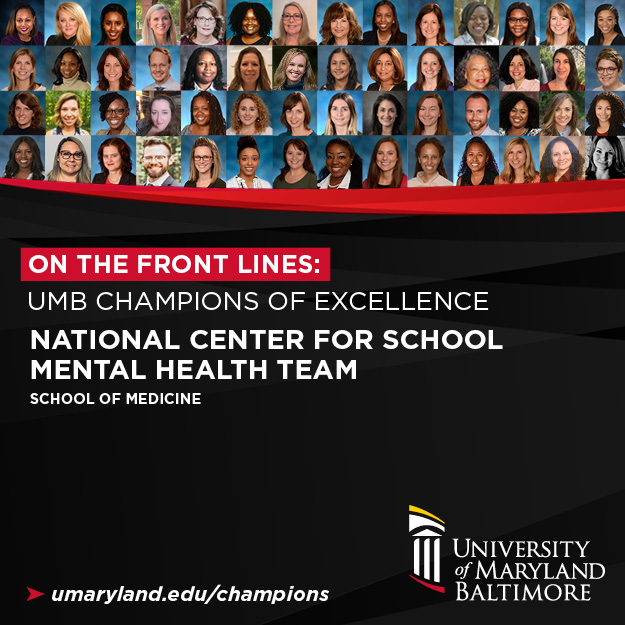On the Front Lines: UMB Champions of Excellence: National Center for School Mental Health Team
March 03, 2021 Jen Badie
The center’s staff supported the emotional well-being of children by pivoting services to telehealth and providing policy and practice guidance to states and school districts across the nation.
The Champions of Excellence campaign is a multiyear branding campaign at the University of Maryland, Baltimore (UMB) in which we highlight individuals and teams that exemplify extraordinary accomplishment and represent excellence at the University. In 2020-21, UMB is highlighting the employees who've done exemplary work during the COVID-19 pandemic, and The Elm will be featuring these UMB Champions, who are making Baltimore, our region, and in some cases the world a better place.
Today: National Center for School Mental Health Team, School of Medicine
When schools shut down a year ago, children’s lives were turned upside-down: learning via screens, physically distancing from friends, and worrying about a global pandemic.
Providing support for their emotional well-being and education has been at the forefront of many Americans’ minds. And a University of Maryland School of Medicine organization — the National Center for School Mental Health (NCSMH) — is sharing its expertise to do just that.
The mission of NCSMH, founded in 1995, is to strengthen policies and programs in school mental health to improve learning and promote success for children. NCSMH clinicians have pivoted the services they provide in Baltimore City and Prince George’s County schools to provide tele-mental health and continue to offer a full array of supports for thousands of students and their families.
“We are definitely seeing increased anxiety and depression and feelings of isolation,” said NCSMH co-director Nancy Lever, PhD. “Students are missing being in the classroom, being able to see and experience the school setting, and have recess and do collaborative activities with their classmates. It definitely has been challenging for them not to have that in-person social-emotional learning and academic learning.”
(Watch video below.)
NCSMH also has addressed the learning models — virtual, hybrid, and in-person — that schools have navigated by developing resources, conducting webinars and tutorials, and providing technical assistance to state departments of education and school districts nationally.
“Our entire team jumped in when we recognized that our young people and our educators are suffering and trying to navigate this new world of learning,” said NCSMH co-director Sharon Hoover, PhD. “Some of the supports that we’ve been able to provide are policy and practice guidance on how to support students’ mental health from a distance learning perspective and how to integrate social-emotional learning into the classroom.”
For these efforts, the NCSMH team has been named a University of Maryland, Baltimore Champion of Excellence.
The NCSMH team “is completely dedicated to child mental health and to the families that they serve, so it’s really meaningful to be acknowledged in this way as a broad team,” Hoover said.
Lever praised the team of about 100 as “caring, hardworking, committed, incredibly flexible, and absolutely creative.”
Not only is the center providing individual and family services, but it also is working with teachers and parents, who have taken on a new role with virtual learning.
“We know teachers are incredibly burdened and stressed right now. We hope that schools will continue to put well-being structures in place for educators to support a healthy workforce because if they’re not well, it’ll be really hard to support students’ mental health,” Hoover said. “And for our families, give yourself permission to not be perfect during this time. We know that parents are layering on many responsibilities, so they need to take care of themselves. They are going to be the eyes and ears for when things do go awry with their children.”
Lever said the team is excited to return to its in-person work in schools.
“We are very much ready and prepared to return when they tell us it’s safe and schools are open,” she said. “Our goal is to continue to provide that full continuum of care.”